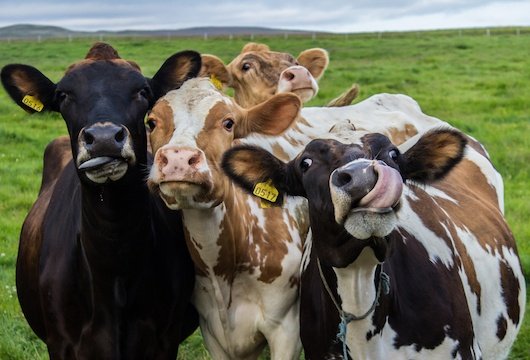
Welcome to Friday Futures, our weekly guide to the latest visions of The Future from around the web. This week: cyborg cows train AI; a cure for the common cold; human memory transfer; Bell Labs art; robots; fresh water; bicycles; and a monster black hole.
Cyborg cows are training AI to track farm diseases in Utah
Bio-monitors implanted in cows are providing data to help train an artificial neural network that will help farmers figure out quickly how well they’re eating, whether they’re getting sick or about to give birth. Read more …
Wait a minute – we may actually be close to a ‘cure’ for the common cold
Researchers at Imperial College London (ICL) have developed a new molecule that doesn’t target cold symptoms or even the virus itself: it affects the cells in our bodies that betray us when we catch a cold. Read more…
Transferring memories between snails – are we next?
You may not carry your house on your back or release sulphuric acid, but you’ve got a lot more in common with a sea snail than you may think. Especially where your brain is concerned. Read more…
Bell Labs hired some artists to make technology more beautiful
“Park, a multimedia artist known for turning brainwaves and heartbeats into performance art, gripped the woman’s hand, and in tandem, they glanced up at the screen where a 3-D rendering of a leafless cherry blossom tree glowed in the dark …” Read more…
Don’t teach your SpotMini to kill things, please
Boston Dynamics announced that it’ll start selling its good boy SpotMini as soon as next year. The CEO made the announcement on stage at TechCrunch’s TC Sessions: Robotics event at UC Berkeley. But should we be terrified? Read more…
Here’s is where and why fresh water appears on earth
A new global, satellite-based study of Earth’s freshwater found that Earth’s wet areas are getting wetter, while dry areas are getting drier. The data suggest this pattern is due to many factors, including human water management practices, human-caused climate change and natural climate cycles. Read more…
Scientists just found a monster black hole
Astronomers have found the fastest-growing black hole known in the universe, describing it as a monster that devours a mass equivalent to our sun every two days. Read more…
Robo bees can save species from extinction
They learn how the organisms they’ve been sent to study operate and socialize, then use their new knowledge to steer the cultures they’ve infiltrated towards what their creators decide will be a better future. Read more…
Why the bicycle is actually the future of transport
The most exciting form of transportation technology is more than 100 years old — and it’s probably sitting in your garage. It’s the bicycle. Read more…
(Compiled by Alex Leslie; Edited by John C. Tanner)

Be the first to comment